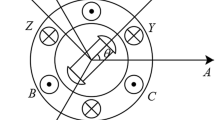Abstract
In this paper, an adaptive robust finite-time neural control scheme is proposed for uncertain permanent magnet synchronous motor servo system with nonlinear dead-zone input. According to the differential mean value theorem, the dead zone is represented as a linear time-varying system, and the model uncertainty including the dead zone is approximated by using a simple neural network. Then, an adaptive finite-time controller is designed based on a fast terminal sliding mode control principle, and the singularity problem in the initial TSMC is circumvented by modifying the terminal sliding manifold. Comparative experiments are conducted to validate the effectiveness and superior performance of the proposed method.








Similar content being viewed by others
References
Li SH, Liu Z (2009) Adaptive speed control for permanent-magnet synchronous motor system with variations of load inertia. IEEE Trans Ind Electron 56(8):3050–3059
Morawiec M (2013) The adaptive backstepping control of permanent magnet synchronous motor supplied by current source inverter. IEEE Trans Ind Inform 9(2):1047–1055
Liu G, Chen L, Zhao W et al (2013) Internal model control of permanent magnet synchronous motor using support vector machine generalized inverse. IEEE Trans Ind Inform 9(2):890–898
Tao G, Lewis FL (2001) Electric motor drives: modeling, analysis, and control. Springer, Berlin
Hu CX, Yao B, Wang QF (2011) Adaptive robust precision motion control of systems with unknown input dead-zones: a case study with comparative experiments. IEEE Trans Ind Electron 58(6):2454–2464
Han SI, Lee JM (2013) Precise positioning of nonsmooth dynamic systems using fuzzy wavelet echo state networks and dynamic surface sliding mode control. IEEE Trans Ind Electron 60(11):5124–5136
Xia D, Wang LY, Chai TY (2014) Neural-network friction compensation based energy swing-up control of pendubot. IEEE Trans Ind Electron 61(3):1411–1423
Naso D, Cupertino F, Turchiano B (2010) Precise position control of tubular linear motors with neural networks and composite learning. Control Eng Pract 18(5):515–522
Wang XS, Su CY, Hong H (2014) Robust adaptive control of a class of linear systems with unknown dead-zone. Automaica 40(3):407–413
Hua CC, Wang QG, Guan XP (2008) Adaptive tracking controller design of nonlinear systems with time delays and unknown dead-zone input. IEEE Trans Autom Control 53(7):1753–1759
Ibrir S, Xie WF, Su CY (2007) Adaptive tracking of nonlinear systems with non-symmetric dead-zone input. Automatica 43(3):522–530
Zhang TP, Ge SS (2007) Adaptive neural control of MIMO nonlinear state time-varying delay systems with unknown dead-zones and gain signs. Automatica 43(6):1021–1033
Zhang TP, Ge SS (2009) Adaptive neural network tracking control of MIMO nonlinear systems with unknown dead zones and control directions. IEEE Trans Neural Netw 20(3):483–497
Liu YJ, Zhou N (2010) Observer-based adaptive fuzzy-neural control for a class of uncertain nonlinear systems with unknown dead-zone input. ISA Trans 49(4):462–469
Na J, Ren XM, Herrmann G, Qiao Z (2011) Adaptive neural dynamic surface control for servo systems with unknown dead zone. Control Eng Pract 19(11):1328–1343
Man ZH, Paplinski AP, Wu HR (1994) A robust MIMO terminal sliding mode control scheme for rigid robotic manipulator. IEEE Trans Autom Control 39(12):2464–2469
Yu XH, Man ZH (2002) Fast terminal sliding-mode control design for nonlinear dynamical systems. IEEE Trans Circuits Syst I Fundam Theory Appl 49(2):261–264
Hong Y, Huang J, Xu Y (2001) On an output finite-time stabilization problem. IEEE Trans Autom Control 46(2):305–309
Feng Y, Yu XH, Man ZH (2002) Non-singular terminal sliding mode control of rigid manipulators. Automatica 38(12):2159–2167
Yu S, Yu XH, Shirinzadehc B (2005) Continuous finite-time control for robotic manipulators with terminal sliding mode. Automatica 41(11):1957–1964
Zhao DY, Li SY, Gao F (2009) A new terminal sliding mode control for robotic manipulators. Int J Control 82(10):1804–1813
Tang L, Liu YJ, Tong SC (2014) Adaptive neural control reinforcement learning for a class of robot manipulator. Neural Comput Appl 25:135–141
Na J, Chen Q, Ren XM, Guo Y (2014) Adaptive prescribed performance motion control of servo mechanisms with friction compensation. IEEE Trans Ind Electron 61(1):486–494
Na J, Ren XM, Zheng DD (2013) Adaptive control of nonlinear pure-feedback systems with high-order sliding mode observer. IEEE Trans Neural Netw Learn Syst 24(3):370–382
Wang LY, Chai TY, Zhai LF (2009) Neural-network-based terminal sliding-mode control of robotic manipulators including actuator dynamics. IEEE Trans Ind Electron 56(9):3296–3304
Zou AM, Kumar KD, Hou ZG, Liu X (2011) Finite-time attitude tracking control for spacecraft using terminal sliding mode and Chebyshev neural network. IEEE Trans Syst Man Cybern B Cybern 41(4):950–963
Lee MJ, Choi YK (2004) An adaptive neurocontroller using RBFNN for robot manipulators. IEEE Trans Ind Electron 51(3):711–717
Bhat SP, Bernstein DS (2000) Finite-time stability of continuous autonomous systems. SIAM J Control Optim 38(3):751–766
Acknowledgments
The authors would thank the support from the National Natural Science Foundation of China under Grants Nos. 61403343, 61433003 and 61573174, and China Postdoctoral Science Foundation Funded Project under Grant No. 2015M580521.
Author information
Authors and Affiliations
Corresponding author
Rights and permissions
About this article
Cite this article
Chen, Q., Ren, X., Na, J. et al. Adaptive robust finite-time neural control of uncertain PMSM servo system with nonlinear dead zone. Neural Comput & Applic 28, 3725–3736 (2017). https://doi.org/10.1007/s00521-016-2260-5
Received:
Accepted:
Published:
Issue Date:
DOI: https://doi.org/10.1007/s00521-016-2260-5



